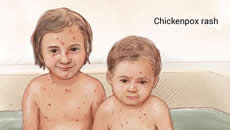Chickenpox
 | Chickenpox, also called varicella is a highly contagious viral infection caused by the varicella-zoster virus, which is a member of the herpes group of viruses it is usually a mild disease that lasts a short time in healthy children. However, it can be severe in adults and may cause serious or even fatal complications in people of any age. |
- Preventable by vaccine
- Usually self-treatable
- Spreads easily
- Usually self-diagnosable
- Lab tests or imaging rarely required
- Short-term: resolves within days to weeks
How it spreads
- By mother to baby by pregnancy, labour, or nursing
- By airborne respiratory droplets (coughs or sneezes)
- By skin-to-skin contact (handshakes or hugs)
- By saliva (kissing or shared drinks)
- By touching a contaminated surface (blanket or doorknob)
Symptoms
Symptoms of chickenpox take between 10 to 21 days (14 to 16 days on average to show after infection). The most characteristic symptom is an itchy, blister-like rash on the skin.
- Skin: blister, scab, ulcers, or red spots
- Whole body: fatigue, headache, fever, or loss of appetite
- Also common: headache, itching, sore throat, or swollen lymph nodes
Infection during pregnancy can result in congenital abnormalities in the baby, therefore this vaccine is highly recommended for women who are planning their pregnancies. The varicella virus can also reactivate many years after the initial infection and cause shingles (herpes zoster).
Treatment
Usually involves relieving symptoms, although high-risk groups may receive antiviral medication.
- Medications:
- Analgesic: Relieves pain
- Antiviral drug: Reduces viruses’ ability to replicate
- Antihistamine: Reduces or stops an allergic reaction
- Self-care:
- Oatmeal bath: A mixture of oatmeal and water that soothes irritated skin
- Moisturiser: Hydrates and protects skin from damage
- Specialists:
- Paediatrician: Provides medical care for infants, children and teenagers
- General Practitioner (GP): Prevents, diagnoses and treats diseases
Chickenpox Vaccine
Chickenpox vaccine (PDF file, 291.4 KB) can prevent chickenpox. Most people who get chickenpox vaccine will not get chickenpox. But if someone who has been vaccinated does get chickenpox, it is usually very mild. They will have fewer blisters, are less likely to have a fever, and will recover faster.
Anyone who is not fully vaccinated, and never had chickenpox, should receive one or two doses of chickenpox vaccine. The timing of these doses depends on the person’s age. Chickenpox vaccine may be given at the same time as other vaccines.
Please let us know if you have ever had a serious (life-threatening) allergic reaction to a previous dose of chickenpox vaccine; or if you have a weakened immune system because of HIV/AIDS or another disease that affects the immune system, treatment with drugs that affect the immune system (steroids), or cancer/cancer treatment with radiation or drugs. If you are moderately or severely ill, you should probably postpone having the vaccine. It is important for the Doctor to know if you have recently had a transfusion or were given other blood products before getting the vaccine.
Varicella vaccine is a live vaccine, meaning it cannot be administered to pregnant women and it cannot be given if you have already received another live vaccine within 28 days.
Vaccination is recommended for all non-immune adolescents and adults. Two doses of varicella vaccine must be administered to achieve adequate protection from varicella and it should be given at least 4 weeks apart. However, a longer interval between vaccine doses is acceptable.
Dosage and Administration
The dose of varicella vaccine is 0.5mL, to be given by subcutaneous injection.
What do you have to do?
Book in to consult one of our Doctors today if you have any symptoms or if you would like the vaccine.